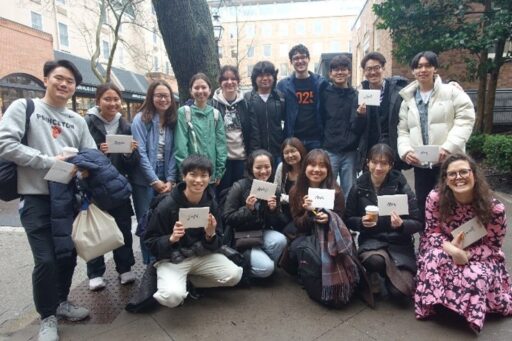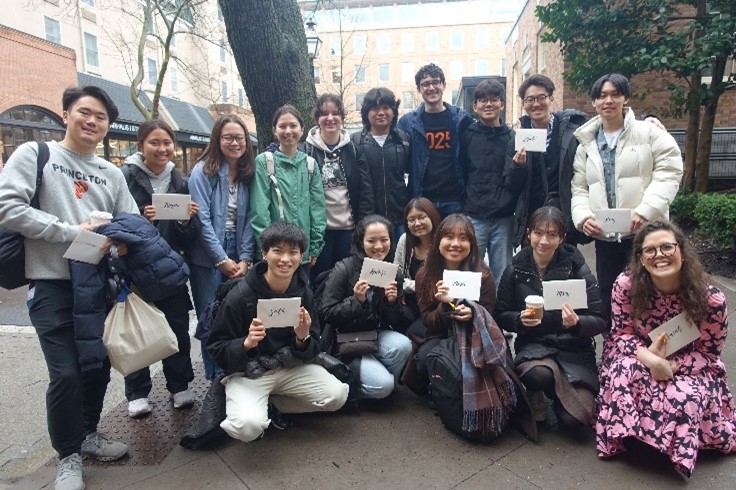UTokyo’s Center for Global Education (UTokyo GlobE) hosted a spring program entitled “People and Culture of Japan in the United States: Past, Present, and Future” in collaboration with Princeton University’s Global Japan Lab. A total of 16 undergraduate students (eight from each institution) participated in the program and studied together at UTokyoNY (March 9-12), Rutgers University (March 13), and Princeton University (March 14-16).
At UTokyoNY, the students attended lectures by UTokyo faculty and distinguished guests. For example, Professor Jin Sato (Institute of Advanced Studies on Asia, UTokyo / Visiting Professor at Columbia University / Former Visiting Professor at Princeton) reflected on his global career and emphasized the importance of encountering others and maintaining the “range of thoughts.” Students found his teaching approach inspiring. As one of them recalled, “He started the lecture by showing us an optical illusion where both a young woman and an old woman can be seen in one illustration, pointing out how multiple approaches and perspectives exist to view one thing.”
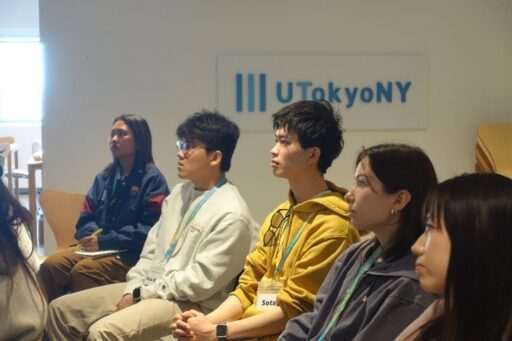
Professor Kenneth Mori McElwain (Institute of Social Science, UTokyo / Visiting Professor at Columbia University / Princeton graduate) lectured on the Constitution of Japan, which has not been amended for over 75 years. Professor McElwain presented some of the findings of his quantitative research into the constitutions of different countries, which demonstrated the value of scientific objectivity. One student reflected, “By comparing Japan’s situation with global constitutional trends, he provided an unbiased, broader perspective on where Japan stands in the world.”
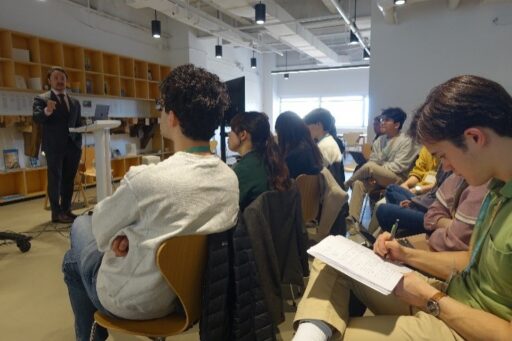
One of the highlights of the week was a dialogue between the students and Ambassador Mikio Mori (Consul General of Japan in New York / UTokyo graduate). Topics they discussed ranged over many current issues, such as the Trump administration, its impact on the Japan-U.S. relationship, and Nippon Steel’s plan to acquire U.S. Steel. It was a real privilege to be able to have conversation with the Ambassador, who was described by one student as “a professional working on the frontlines of the Japan-U.S. relationship.”
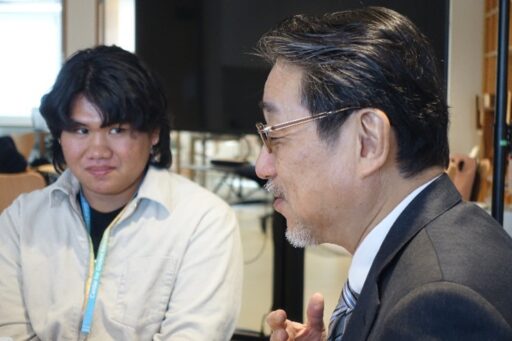
Mr. Taka Komagata, who is a New York-based tenor and opera singer, added a different color to the program. His singing performance impressed the students, most of whom had little or even no experience of going to the opera. Mr. Komagata also spoke about his career and the challenges he has faced, discussing many topics such as the prime age of opera singers and typecasting in the opera industry.
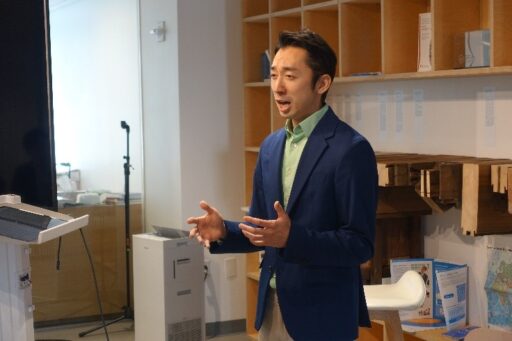
Professor Haruko Wakabayashi (Department of Asian Languages and Cultures, Rutgers University / Princeton graduate) gave a lecture on Japanese students who studied at Rutgers University in the late 19th century, such as Koroku Katsu, the son of Kaishu Katsu, who played a key role in the Meiji Restoration. Professor Wakabayashi introduced a letter exchanged between Kaishu and William Elliot Griffis, who tutored the Japanese students at Rutgers and Kaisei Gakko (later UTokyo). One student whose home happens to be near the Kaishu Katsu Memorial Museum in Tokyo said she found the lecture very exciting as it connected “the seemingly distant histories of my neighborhood and a university across the pacific.”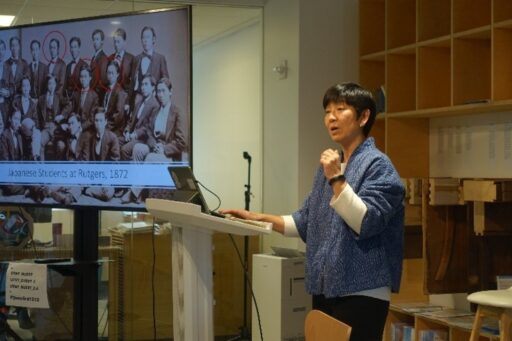
On March 13, the students left New York City and visited Rutgers University to attend a lecture by Dr. Fernanda Perrone (Archivist and librarian, Rutgers’ Archibald S. Alexander Library). Dr. Perrone introduced the William Elliot Griffis Collection and invited the students to examine valuable materials such as manuscripts, photographs, and correspondences documenting Griffis’ work at Rutgers and in Japan. This experience and the lecture by Professor Wakabayashi complemented each other, deepening students’ understanding of first Japanese people who studied in America.
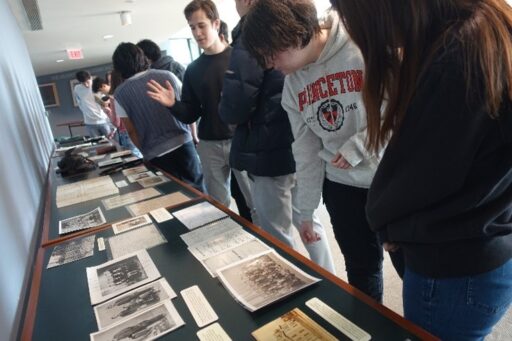
Following the time at Rutgers, students moved to Princeton. On March 14, they attended two classes taught by Princeton faculty. In the seminar led by Dr. Junko Yamazaki (Assistant Professor of Japanese media studies, Princeton University), several scenes from the Japanese film “100 Yen Love” were screened, and the circumstances of the 32-year-old female protagonist were analyzed from a perspective of the feminism discourse. In the hands-on gaming workshop hosted by Dr. Akil Fletcher (Society of Fellows, Princeton University), students considered racial representations in the video games. As one student reflected, s/he realized fictional game characters “reflect stereotypes, biases, and power dynamics in
current society.”
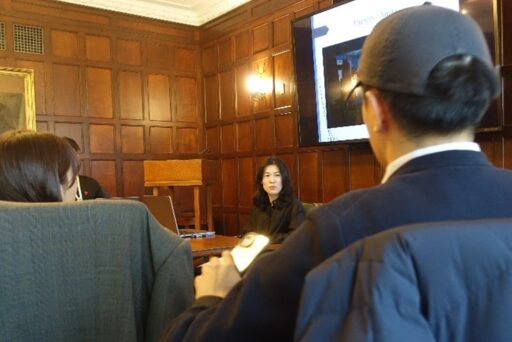
On the morning of March 15, Professor James Raymo (Department of Sociology / Henry Wendt III Professor of East Asian Studies, Princeton University) delivered a lecture on two population issues: immigration from Japan to the U.S. and the declining population in Japan. The lecture inspired students to think about population issues the country has faced. As one student noted, “many (Japanese people) remain hesitant about large scale immigration” despite the dwindling population. Professor Raymo and students had lively discussions, which continued over the lunch break.
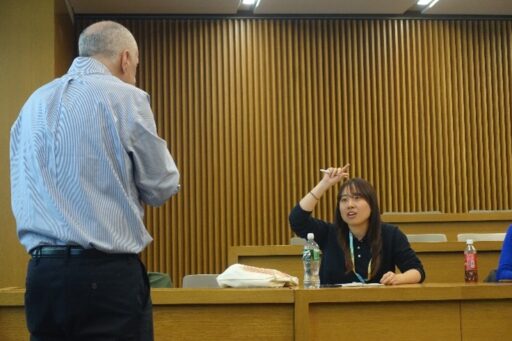
The program also offered informal learning experiences, such as a visit to the Noguchi Museum in Long Island City, which exhibits sculptures by Isamu Noguchi. In Princeton, they attended a classical music performance at Richardson Auditorium. Additionally, Princeton students kindly guided their UTokyo peers around the Princeton campus. Through a variety of activities beyond the classroom, the students from both universities were able to build lasting friendships in a short period of time.
